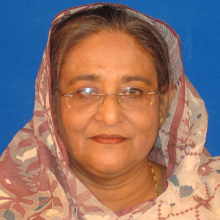
Biography
Sheikh Haisna was born on September 28, 1947 at Tungipara in Gopalganj district. She was the eldest of five children of Father of the Nation Bangabandhu Sheikh Mujibur Rahman and Bangamata Begum Fazilatunnesa. In 1968, Hasina was married to eminent nuclear scientist M Wazed Miah. Together they have one son and a daughter.
Sheikh Hasina was in the then West Germany with her younger sister Sheikh Rehana on the fateful night of August 15, 1975 when Bangabandhu Sheikh Mujibur Rahman along with the remaining members of his family was brutally assassinated. She was forced to live in exile in London and Delhi for the next six years.
Hasina was elected the President of Bangladesh Awami League in 1981 in her absence and returned home on May 17 the same year. She was the first to raise the voice against the autocratic regime of military ruler H.M. Ershad. Under her leadership, Awami League spearheaded the movement for democracy which brought about the fall of Ershad in 1991.
Through the parliamentary elections of 1991, Awami League emerged as the largest opposition party in Bangladesh. As the opposition leader, she was always vocal against the tyranny of the BNP government. Her tireless contribution to the movement against the government’s misrule forced BNP to dissolve parliament and call for early elections.
Awami League secured a massive victory in the elections on 12 June, 1996, and formed the government. Sheikh Hasina became the Prime Minister of the People’s Republic of Bangladesh. One of the major achievements of her government was the signing of CHT Peace Accord which ended a decades-long ethnic insurgency in the Chittagong Hill Tracts. Another significant achievement was the signing of Ganges Water sharing treaty with India.
In one of the most controversial elections in the country’s history, BNP-led four party alliance won majority of the parliamentary seats in 2001 and Hasina became the opposition leader for the second time. Despite several assassination attempts including the grenade attack on August 21, 2004, she remained vocal against the misrule of the alliance government.
After the two year-long democratic vacuum created by what known as 1/11 interim government, the people of Bangladesh voted Awami League-led grand alliance to power with a landslide victory in the general elections on December 29, 2008. Sheikh Hasina once again became the Prime Minister of Bangladesh for the second time, ushering in a new era of democracy in the country.
In recognition of her leadership excellence and intellectual finesses, Sheikh Hasina has been conferred with-
Honorary Doctor of Laws by the Waseda University of Japan
Honorary Doctorate of Philosophy in Liberal Arts by University of Abertay Dundee, UK
Honorary Degree of Desikottama by Visva-Bharati University of West Bengal, India
Honorary Doctor of Laws, by the Australian National University
Honorary Doctor of Humane Letters by the Bridgeport University, USA
Honorary Doctor of Laws by the University of Dhaka, Bangladesh
Paul Haris Fellowship by the Rotary International
UNESCO's Houphouet-Boigny Peace Prize, 1998
M K Gandhi Award, 1998
Mother Teresa Award, 1998 and 2006
Pearl S. Buck Award by Randolph Macon Women's College of USA, 1999
CERES Medal, 1999
UN Award for MDG achievement (child mortality), 2010
Indira Gandhi Peace Prize, 2009
South-South Award, 2011
UN Award for MDG Achievement, 2013
Rotary Peace Prize, 2013
Tree of Peace, 2014
ICT Sustainable Development Award, 2015
Champions of the Earth, 2015
Agent of Change Award, 2016
Planet 50-50 Champion, 2016

